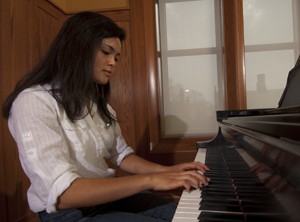
When Sarah Fern was asked to play at the Chancellor’s Concert at Washington University in St. Louis in April 2009, she chose Schumann’s Piano Concerto in A Minor.
After an opening flourish, the oboe introduces the theme, which is picked up by the piano and then lovingly passed between the piano and clarinet. The solo instrument and the orchestra interweave until the final cadenza, where the pianist finally unleashes the full range and power of her instrument.
“It was fantastic; I absolutely loved it,” Fern says. “It was a lot of fun to make music with an entire orchestra, and it was a new challenge as well, because I really had to listen to the other musicians and work closely with the conductor.”
Ron Laue, assistant dean of engineering student services, in the audience with his daughter, was moved to write Fern a note, thanking her and praising “the seamless flow and grace with which you played such a difficult piece.”
What he didn’t say was that he was astonished that one of the university’s engineering students played at the level of a concert pianist.
Fern, who will graduate with a minor in music-piano performance, considered music as a career.
“She’s just as talented as many students that you’ll find at a conservatory,” says her piano teacher of four years, Seth Carlin, professor of music and director of the piano program in the Department of Music in Arts & Sciences. “She’s not just good technically,” he says, “she’s also a very poetic player.”
“He was very inspiring,” Fern says. “He didn’t tell me how to play a piece, but instead encouraged me to think about the character I wanted to bring out in the piece.”
Given her musical talent, it is a surprise to learn that when Fern applied to WUSTL, she applied to the School of Engineering & Applied Science.
A McKelvey Scholar, she will graduate with honors in systems science and engineering May 20 and already has accepted a position as a business technology analyst with the consulting firm Deloitte in Chicago.
Like many talented people, Fern has more than one interest. She chose engineering because she had loved math as a high school student in Naperville, Ill. “Although it turns out that engineering is about a lot more than math,” she says.
Perhaps she was also influenced by her father, a chemist trained at Northwestern University who is president of Eichrom Technologies, a supplier to the nuclear industry.
Systems engineering, she says, is a capacious discipline whose purpose is to devise strategies to solve problems ranging from continually adjusting the control surfaces of an aircraft to keep it aloft to placing orders for an assembly line in such a way that parts arrive just as they are needed.
Working with Gautam N. Yadama, PhD, associate professor and director of international programs at the Brown School, for example, she and engineering classmate Andrew Frangos built a system dynamics model to investigate what might motivate poor rural communities in India to adopt alternatives to traditional cook stoves, which have been linked to health and environmental problems.
“We got to travel to Rajasthan, India, with our professor this past winter,” she says, “to do field research in two such communities, and we hope to present our model at the Systems Dynamics Society conference in Washington, D.C. this summer.”
“Everyone in the music department is impressed that she had a job lined up three or four months before she graduated,” Carlin says. But Carlin, and everyone else, who has heard Fern play, is wistful about her music and the spell it wove, and hopes that wherever life takes her, she will find quiet moments to spend with Schumann, Ravel and Chopin.
She plans to, she says.